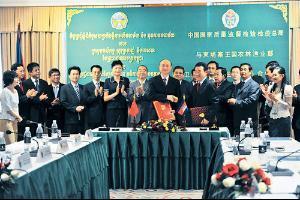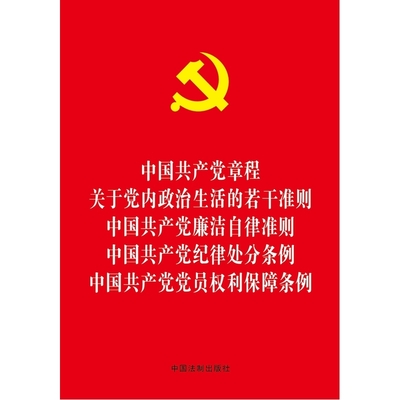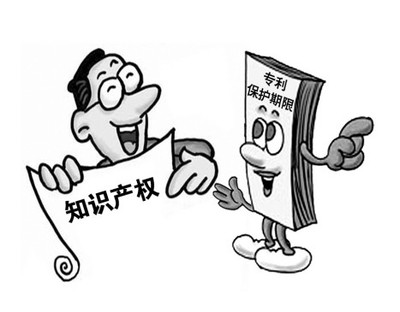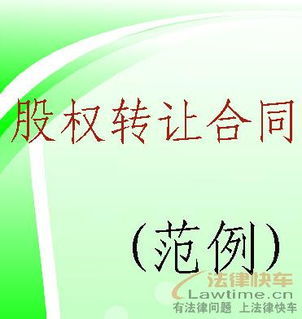
Agreement on the Application ofSanitary and Phytosanitary Measures(SPS)
实施动植物卫生检疫措施的协议 ( SPS协定)
SPS协议全称为《实施动植物卫生检疫措施的协议》,对国际贸易中的动植物检疫提出了具体的严格的要求,它是WTO协议原则渗透的动植物检疫工作的产物,是世界贸易组织(WTO)在长达8年之久的乌拉圭回合谈判的一个重要的国际多边协议成果。
Members, 各成员:
Reaffirming that no Member should be prevented fromadopting or enforcing measures necessary to protect human, animalor plant life or health, subject tothe requirement that these measures are not applied in a mannerwhich would constitute a means of arbitrary or unjustifiablediscrimination between Members where the same conditions prevail ora disguised restriction on international trade;
重申不应阻止各成员采纳或实施为保护人类、动物或植物的生命或健康所必须的措施。只要这些措施的实施方式,不在情形相同的成员之间构成任意或不合理的歧视,或对国际贸易构成变相的限制;
Desiringto improve the human health, animal health and phytosanitarysituation in all Members;
期望改善各成员的人民健康、动物健康和植物卫生状况;
Notingthat sanitary and phytosanitary measures are often applied on thebasis of bilateral agreements or protocols;
注意到动植物卫生检疫措施通常以双边协议或议定书为基础实施;
Desiring the establishmentof a multilateral framework of rules and disciplines to guide thedevelopment, adoption and enforcement of sanitary and phytosanitarymeasures in order to minimize theirnegative effects on trade;
期望建立规则和纪律的多边框架,以指导动植物卫生检疫措施的制定、采用和实施,从而使其对贸易的消极作用降到最小;
Recognizing the importantcontribution that international standards, guidelines andrecommendations can make in this regard;
承认国际标准、准则和建议可以在该领域能作出重大贡献;
Desiringto further the use of harmonized sanitary and phytosanitarymeasures between Members, on the basis of international standards,guidelines and recommendations developed by the relevantinternational organizations, including the Codex AlimentariusCommission, the International Office of Epizootics, and therelevant international and regional organizations operating withinthe framework of the International Plant Protection Convention,without requiring Members to change their appropriate level ofprotection of human, animal or plant life or health;
期望进一步推动各成员使用以有关国际组织所制定的国际标准、准则和建议为基础的统一的动植物卫生检疫措施,这些国际组织包括国际营养标准委员会,国际兽疫局,以及在国际植物保护公约框架下运行的有关国际和区域组织;但不要求各成员改变其合理的保护人类、动物或植物的生命或健康的水平;
Recognizing that developing country Members may encounterspecial difficulties in complying with the sanitary orphytosanitary measures of importing Members, and as a consequencein access to markets, and also in the formulation and applicationof sanitary or phytosanitary measures in their own territories, anddesiring to assist them in their endeavours in thisregard;
承认发展中国家成员在遵守进口成员的动植物卫生检疫措施方面可能遇到特殊的困难,进而在市场准入以及在其制定和实施国内动植物卫生检疫措施方面也会遇到困难,期望在这方面给予他们帮助;
Desiringtherefore to elaborate rules for the application of the provisionsof GATT 1994 which relate to the use of sanitary or phytosanitarymeasures, in particular the provisions of ArticleXX(b);(1)
期望因此对如何实施1994年关贸总协定中与动植物卫生检疫措施有关的条款,特别是第二十条(b)款的实施制定具体规则;
Hereby agree asfollows: 协议如下:
Article 1:General Provisions第一条 总则
1. ThisAgreement applies to all sanitary and phytosanitary measures whichmay, directly or indirectly, affect internationaltrade. Such measures shall bedeveloped and applied in accordance with the provisions of thisAgreement.
本协议适用于所有可能直接或间接影响国际贸易的动植物卫生检疫措施,这类措施应按照本协议的条款来制定和实施。
2. For the purposes of thisAgreement, the definitions provided in Annex A shallapply.
为本协议之目的,附件1中规定的定义都适用。
3. The annexes are anintegral part of this Agreement.
各附件是本协议的不可分割的组成部分。
4. Nothing in this Agreementshall affect the rights of Members under the Agreement on TechnicalBarriers to Trade with respect to measures not within the scope ofthis Agreement.
对不在本协议范围之内的措施,本协议不应影响各成员在技术性贸易壁垒协议项下所享有的权利。
Article 2:Basic Rights and Obligations第二条 基本权利和义务
1. Membershave the right to take sanitary and phytosanitary measuresnecessary for the protection of human, animal or plant life orhealth, provided that such measures are not inconsistent with theprovisions of this Agreement.
各成员有权采取为保护人类、动物或植物的生命或健康所必需的动植物卫生检疫措施,但这类措施不应违背本协议的规定。
2. Members shall ensure thatany sanitary or phytosanitary measureis appliedonly to the extent necessary to protect human, animal orplant life or health, is based on scientific principles and is notmaintained without sufficient scientific evidence, except asprovided for in paragraph 7 of Article 5.
各成员应确保任何动植物卫生检疫措施的实施不超过为保护人类、动物或植物的生命或健康所必需的程度,并以科学原理为依据,如无充分的科学依据则不再实施,但第五条第7款规定的除外。
3. Members shall ensure thattheir sanitary and phytosanitary measures do not arbitrarily orunjustifiably discriminate between Members where identical orsimilar conditions prevail, including between their own territoryand that of other Members. Sanitaryand phytosanitary measures shall not be applied in a manner whichwould constitute a disguised restriction on internationaltrade.
各成员应确保其动植物卫生检疫措施不在情形相同或情形相似的成员之间,包括在成员自己境内和其他成员领土之间构成任意或不合理的歧视。动植物卫生检疫措施的实施不应对国际贸易构成变相的限制。
4. Sanitary or phytosanitarymeasures which conform to the relevant provisions of this Agreementshall be presumed to be in accordance with the obligations of theMembers under the provisions of GATT 1994 which relate to the useof sanitary or phytosanitary measures, in particular the provisionsof Article XX(b).
符合本协议有关条款规定的动植物卫生检疫措施,应被认为符合各成员在1994年关贸总协定有关采用动植物卫生检疫措施的义务,特别是第二十条(b)款的规定。
Article 3:Harmonization第三条 协调一致
1. Toharmonize sanitary and phytosanitary measures on as wide a basis aspossible, Members shall base their sanitary or phytosanitarymeasures on international standards, guidelines or recommendations,where they exist, except as otherwise provided for in thisAgreement, and in particular in paragraph 3.
为尽可能广泛地协调动植物卫生检疫措施,各成员的动植物卫生检疫措施应以国际标准、准则或建议为依据,除非本协议,特别是第3款中另有规定。
2.Sanitary or phytosanitary measures which conform to internationalstandards, guidelines or recommendations shall be deemed to benecessary to protect human, animal or plant life or health, andpresumed to be consistent with the relevant provisions of thisAgreement and of GATT 1994.
符合国际标准、准则或建议的动植物卫生检疫措施应视为是保护人类、动物或植物的生命或健康所必需的,并被认为符合本协议和1994年关贸总协定有关条款的规定。
3. Membersmay introduce or maintain sanitary or phytosanitary measures whichresult in a higher level of sanitary or phytosanitary protectionthan would be achieved by measures based on the relevantinternational standards, guidelines or recommendations, if there isa scientific justification, or as a consequence of the level ofsanitary or phytosanitary protection a Member determines to beappropriate in accordance with the relevant provisions ofparagraphs 1 through 8 of Article 5(2) Notwithstanding the above, allmeasures which result in a level of sanitary or phytosanitaryprotection different from that which would be achieved by measuresbased on international standards, guidelines or recommendationsshall not be inconsistent with any other provision of thisAgreement.
各成员可以实施或维持比以有关国际标准、准则或建议为依据的措施所提供的保护水平更高的动植物卫生检疫措施,但要有科学依据,或者一成员根据第五条第1款至第8款中有关条款规定,认为该措施所提供的保护水平是合适的。除上述外,若某措施所产生的动植物卫生保护水平不同于以国际标准、准则或建议为依据制定的措施所提供的保护水平,则一概不可违背本协议中其他任何条款的规定。
4. Membersshall play a full part, within the limits of their resources, inthe relevant international organizations and their subsidiarybodies, in particular the Codex Alimentarius Commission, theInternational Office of Epizootics, and the international andregional organizations operating within the framework of theInternational Plant Protection Convention, to promote within theseorganizations the development and periodic review of standards,guidelines and recommendations with respect to all aspects ofsanitary and phytosanitary measures.
各成员应尽其所能全面参与有关国际组织及其附属机构,特别是国际营养标准委员会,国际兽疫局,以及在国际植物保护公约框架下运行的有关国际和区域组织,以便促进在这些组织中对有关动植物卫生检疫措施各个方面的标准、准则和建议的制订和定期审议。
5. TheCommittee on Sanitary and Phytosanitary Measures provided for inparagraphs 1 and 4 of Article 12 (referred to in this Agreement asthe “Committee”) shall develop a procedure to monitor the processof international harmonization and coordinate efforts in thisregard with the relevant international organizations.
在第十二条第1和第4款中提到的动植物卫生检疫措施委员会(本协议中简称"委员会")应制定程序,以监督国际统一化进程,并在这方面和有关国际组织协同努力。
Article 4:Equivalence第四条 同等对待
1. Membersshall accept the sanitary or phytosanitary measures of otherMembers as equivalent, even if these measures differ from their ownor from those used by other Members trading in the same product, ifthe exporting Member objectively demonstrates to the importingMember that its measures achieve the importing Member’s appropriatelevel of sanitary or phytosanitaryprotection. For this purpose,reasonable access shall be given, upon request, to the importingMember for inspection, testing and other relevantprocedures.
如果出口成员客观地向进口成员表明它所采用的动植物卫生检疫措施达到了进口成员适当的动植物卫生检疫保护水平,即使这些措施不同于进口成员自己的措施,或不同于从事同一产品贸易的其他成员所采用的措施,各成员应同等地接受其他成员的动植物卫生检疫措施。为此,根据请求,应向进口成员提供进行检验、测试,以及执行其他有关程序的合理的机会。
2. Members shall, uponrequest, enter into consultations with the aim of achievingbilateral and multilateral agreements on recognition of theequivalence of specified sanitary or phytosanitarymeasures.
各成员应根据要求进行磋商,以便就所规定的动植物卫生检疫措施同等性的承认达成双边和多边协议。
Article 5:Assessment of Risk and Determination of the Appropriate Level ofSanitary or Phytosanitary Protection
第五条 风险评估以及适当的动植物卫生检疫保护水平的确定
1. Members shall ensure thattheir sanitary or phytosanitary measures are based on anassessment, as appropriate to the circumstances, of the risks tohuman, animal or plant life or health, taking into account riskassessment techniques developed by the relevant internationalorganizations.
各成员应确保其动植物卫生检疫措施是依据适应环境的对于人类、动物或植物的生命或健康的风险评估,并考虑到由有关国际组织制定的风险评估技术。
2. In theassessment of risks, Members shall take into account availablescientific evidence; relevantprocesses and production methods;relevant inspection, sampling and testingmethods; prevalence of specificdiseases or pests; existence of pest- or disease-free areas;relevant ecological and environmental conditions; and quarantine orother treatment.
在进行风险评估时,各成员应考虑现有的科学依据;有关的工序和生产方法;有关的检验、抽样和测试方法;某些病害或虫害的流行;病虫害非疫区的存在;有关的生态和环境条件;以及检疫或其他处理方法。
3. Inassessing the risk to animal or plant life or health anddetermining the measure to be applied for achieving the appropriatelevel of sanitary or phytosanitary protection from such risk,Members shall take into account as relevant economicfactors: the potential damage interms of loss of production or sales in the event of the entry,establishment or spread of a pest ordisease; the costs of control oreradication in the territory of the importingMember; and the relativecost-effectiveness of alternative approaches to limitingrisks.
各成员在评估对动物或植物的生命或健康构成的风险,并决定采取措施达到适当的动植物卫生检疫保护水平,以防止这种风险时,应考虑下列相关的经济因素:由于虫害或病害的传入、定居或传播,对生产或销售造成损失的潜在损害;在进口成员领土上控制或根除的病虫害的成本;以及采用其他方法来控制风险的有关实际开支。
4. Membersshould, when determining the appropriate level of sanitary orphytosanitary protection, take into account the objective ofminimizing negative trade effects.
各成员在决定适当的动植物卫生检疫保护水平时,应考虑将对贸易的不利影响减少到最低程度这一目标。
5. Withthe objective of achieving consistency in the application of theconcept of appropriate level of sanitary or phytosanitaryprotection against risks to human life or health, or to animal andplant life or health, each Member shall avoid arbitrary orunjustifiable distinctions in the levels it considers to beappropriate in different situations, if such distinctions result indiscrimination or a disguised restriction on internationaltrade. Members shall cooperate inthe Committee, in accordance with paragraphs 1, 2 and 3 of Article12, to develop guidelines to further the practical implementationof this provision. In developing theguidelines, the Committee shall take into account all relevantfactors, including the exceptional character of human health risksto which people voluntarily expose themselves.
为了达到运用适当的动植物卫生检疫保护水平的概念,在防止对人类生命或健康,动物和植物的生命或健康构成风险方面取得一致性的目的,每个成员应避免在不同的情况下任意或不合理地实施它所认为适当的不同的保护水平,如果这种差异在国际贸易中产生歧视或变相限制。各成员应根据本协议第十二条第1、2和3款中的规定,在委员会中相互合作来制定准则,以推动本条款的实际贯彻。委员会在制定准则时应考虑所有相关因素,包括人们自愿遭受的人身健康风险的例外情况。
6. Without prejudice toparagraph 2 of Article 3, when establishing or maintaining sanitaryor phytosanitary measures to achieve the appropriate level ofsanitary or phytosanitary protection, Members shall ensure thatsuch measures are not more trade-restrictive than required toachieve their appropriate level of sanitary or phytosanitaryprotection, taking into account technical and economicfeasibility.
在不违背第三条第2款规定的前提下,各成员在制定或维持动植物卫生检疫措施以达到适当的动植物卫生检疫保护水平时,考虑到技术和经济可行性,应确保这类措施不比要获取适当的动植物卫生检疫保护水平所要求的更具贸易限制性。
7. Incases where relevant scientific evidence is insufficient, a Membermay provisionally adopt sanitary or phytosanitary measures on thebasis of available pertinent information, including that from therelevant international organizations as well as from sanitary orphytosanitary measures applied by otherMembers. In such circumstances,Members shall seek to obtain the additional information necessaryfor a more objective assessment of risk and review the sanitary orphytosanitary measure accordingly within a reasonable period oftime.
在有关科学依据不充分的情况下,一成员可根据现有的有关信息,包括来自有关国际组织以及其他成员方实施的动植物卫生检疫措施的信息,临时采取某种动植物卫生检疫措施。在这种情况下,各成员应寻求获取必要的补充信息,以便更加客观地评估风险,并相应地在合理的期限内评价动植物卫生检疫措施。
8. When aMember has reason to believe that a specific sanitary orphytosanitary measure introduced or maintained by another Member isconstraining, or has the potential to constrain, its exports andthe measure is not based on the relevant international standards,guidelines or recommendations, or such standards, guidelines orrecommendations do not exist, an explanation of the reasons forsuch sanitary or phytosanitary measure may be requested and shallbe provided by the Member maintaining the measure.
当一成员有理由认为另一成员制定或维持的某种动植物卫生检疫措施正在限制,或潜在限制其产品出口,而这种措施不是以有关国际标准、准则或建议为依据,或者这类标准、准则或建议并不存在,则可要求其解释采用这种动植物卫生检疫措施的理由,并应由维持该措施的成员提供解释。
Article 6:Adaptation to Regional Conditions, Including Pest- or Disease-FreeAreas and Areas of Low Pest or Disease Prevalence
第六条 病虫害非疫区和低度流行区适用地区的条件
1. Members shall ensure thattheir sanitary or phytosanitary measures are adapted to thesanitary or phytosanitary characteristics of the area — whether allof a country, part of a country, or all or parts of severalcountries — from which the product originated and to which theproduct is destined. In assessingthe sanitary or phytosanitary characteristics of a region, Membersshall take into account, inter alia, the level of prevalence ofspecific diseases or pests, the existence of eradication or controlprogrammes, and appropriate criteria or guidelines which may bedeveloped by the relevant international organizations.
各成员应确保其动植物卫生检疫措施要适应当地--即产品的产地及发运地的动植物卫生检疫特点--不论这个地区是一个国家的全部或其部分地区,或几个国家的全部或部分地区。在评估一个地区的动植物卫生特点时,各成员应特别考虑某些病害或虫害的流行程度、现有的根治或控制方案,以及由有关国际组织制定的适当标准或准则。
2. Membersshall, in particular, recognize the concepts of pest- ordisease-free areas and areas of low pest or diseaseprevalence. Determination of suchareas shall be based on factors such as geography, ecosystems,epidemiological surveillance, and the effectiveness of sanitary orphytosanitary controls.
特别是,各成员应承认病虫害非疫区和低度流行区的概念。对这些地区的确定,应依据诸如地理、生态系统、流行病监测,以及动植物卫生检疫效果等因素。
3.Exporting Members claiming that areas within their territories arepest- or disease-free areas or areas of low pest or diseaseprevalence shall provide the necessary evidence thereof in order toobjectively demonstrate to the importing Member that such areasare, and are likely to remain, pest- or disease-free areas or areasof low pest or disease prevalence,respectively. For this purpose,reasonable access shall be given, upon request, to the importingMember for inspection, testing and other relevantprocedures.
出口成员声明其境内某些地区是病虫害非疫区或低度流行区时,应提供必要的证据,以便向进口成员客观地表明这些地区分别是,并很可能继续分别是病虫害非疫区或低度流行区。为此,根据要求应向进口成员提供合理的途径,以便进口成员检验、测试。以及执行其他有关程序。
Article 7:Transparency第七条 透明度
Membersshall notify changes in their sanitary or phytosanitary measuresand shall provide information on their sanitary or phytosanitarymeasures in accordance with the provisions of Annex B.
各成员应通知其动植物卫生检疫措施的改变,并根据附件2有关规定提供其动植物卫生检疫措施的信息。
Article 8:Control, Inspection and Approval Procedures第八条 控制、检验和批准程序
Membersshall observe the provisions of Annex C in the operation ofcontrol, inspection and approval procedures, including nationalsystems for approving the use of additives or for establishingtolerances for contaminants in foods, beverages or feedstuffs, andotherwise ensure that their procedures are not inconsistent withthe provisions of this Agreement.
各成员在实施控制、检验和批准程序,包括批准在食品、饮料或饲料中使用添加剂,或确定污染物允许量的国家制度时,应遵守附件3的规定,并应确保其程序不与本协议规定相抵触。
Article 9:Technical Assistance第九条 技术援助
1. Members agree tofacilitate the provision of technical assistance to other Members,especially developing country Members, either bilaterally orthrough the appropriate internationalorganizations. Such assistance maybe, inter alia, in the areas of processing technologies, researchand infrastructure, including in the establishment of nationalregulatory bodies, and may take the form of advice, credits,donations and grants, including for the purpose of seekingtechnical expertise, training and equipment to allow such countriesto adjust to, and comply with, sanitary or phytosanitary measuresnecessary to achieve the appropriate level of sanitary orphytosanitary protection in their export markets.
各成员同意促成以双边形式或通过适当的国际组织向其他成员,特别是发展中国家成员提供技术援助。这些援助尤其可以在加工技术、研究和基础设施,包括成立国家管理机构等领域;也可以采取建议、信贷、捐赠和转让,包括以寻求技术知识为目的的培训和设备等方式,以使这些国家能调整并遵从为达到其出口市场上的适当的动植物卫生检疫保护水平所必需的动植物卫生检疫措施。
2. Wheresubstantial investments are required in order for an exportingdeveloping country Member to fulfil the sanitary or phytosanitaryrequirements of an importing Member, the latter shall considerproviding such technical assistance as will permit the developingcountry Member to maintain and expand its market accessopportunities for the product involved.
当发展中国家出口成员为达到进口成员的动植物卫生检疫要求而需要大量投资时,后者应考虑提供这类技术援助,以使发展中国家成员得以维持和扩大其相关产品市场准入的机会。
Article10: Special and Differential Treatment第十条 特殊和差别待遇
1. In the preparation andapplication of sanitary orphytosanitary measures, Membersshall take account of the special needs of developing countryMembers, and in particular of the least-developed countryMembers.
各成员在准备和实施动植物卫生检疫措施时,应考虑到发展中国家成员,特别是最不发达国家成员的特殊需要。
2. Where the appropriatelevel of sanitary or phytosanitary protection allows scope for thephased introduction of new sanitary or phytosanitary measures,longer time-frames for compliance should be accorded on products ofinterest to developing country Members so as to maintainopportunities for their exports.
在适当的动植物卫生检疫保护水平允许留有分阶段采用新的动植物卫生检疫措施的余地时,则应给予发展中国家成员有利害关系的产品较长的适应期,以维持其出口机会。
3. With a view to ensuringthat developing country Members are able to comply with theprovisions of this Agreement, the Committee is enabled to grant tosuch countries, upon request, specified, time-limited exceptions inwhole or in part from obligations under this Agreement, taking intoaccount their financial, trade and development needs.
为确保发展中国家成员能遵从本协议的规定,委员会有权根据这些成员的要求,并视其财政、贸易和发展的需要,允许这些国家对于本协议项下义务的全部或部分享有具体和有时限的例外。
4. Members should encourageand facilitate the active participation of developing countryMembers in the relevant international organizations.
各成员应鼓励和促进发展中国家成员积极参加有关的国际组织。
Article11: Consultations and Dispute Settlement第十一条 磋商和争端解决
1. Theprovisions of Articles XXII and XXIII of GATT 1994 as elaboratedand applied by the Dispute Settlement Understanding shall apply toconsultations and the settlement of disputes under this Agreement,except as otherwise specifically provided herein.
除非另有特别规定,经争端解决谅解解释和适用的1994年关贸总协定第二十二条和第二十三条的规定,应适用于本协议的磋商和争端的解决。
2. In a dispute under thisAgreement involving scientific or technical issues, a panel shouldseek advice from experts chosen by the panel in consultation withthe parties to the dispute. To thisend, the panel may, when it deems it appropriate, establish anadvisory technical experts group, or consult the relevantinternational organizations, at the request of either party to thedispute or on its own initiative.
在本协议涉及科学或技术问题的争端中,专家组应征询由专家组与争端各方协商选出的专家的意见。为此,专家组可根据争端任何一方的要求或自己主动在它认为适当的时候,成立技术专家咨询组,或与有关的国际组织协商。
3. Nothing in this Agreementshall impair the rights of Members under other internationalagreements, including the right to resort tothe good offices or disputesettlement mechanisms of other international organizations orestablished under any international agreement.
本协议中的任何内容不应损害成员在其他国际协议项下的权利,包括利用其他国际组织或根据任何国际协议建立的斡旋或争端解决机制的权利。
Article12: Administration第十二条 管理
1. A Committee on Sanitaryand Phytosanitary Measures is herebyestablished to provide a regular forum forconsultations. It shall carry outthe functions necessary to implement the provisions of thisAgreement and the furtherance of its objectives, in particular withrespect to harmonization. TheCommittee shall reach its decisions by consensus.
现成立动植物卫生检疫委员会,为磋商提供一个经常性的场所。它应履行必要的职能,以执行本协议的各项规定,并推动其目标,特别是有关协调一致的目标的实现。委员会应通过一致同意作出决定。
2. The Committee shallencourage and facilitate ad hoc consultations or negotiations amongMembers on specific sanitary or phytosanitaryissues. The Committee shallencourage the use of international standards, guidelines orrecommendations by all Members and, in this regard, shall sponsortechnical consultation and study with the objective of increasingcoordination and integration between international and nationalsystems and approaches for approving the use of food additives orfor establishing tolerances for contaminants in foods, beverages orfeedstuffs.
委员会应鼓励和促进各成员间就特定的动植物卫生检疫问题进行不定期的磋商或谈判。委员会应鼓励所有成员采用国际标准、准则和建议。在这方面,它应举办技术磋商并开展研究,以提高在批准使用食品添加剂,或确定食品、饮料或饲料中污染物允许量的国际与国家制度或方法方面的协调性和一致性。
3. The Committee shallmaintain close contact with the relevant internationalorganizations in the field of sanitary and phytosanitaryprotection, especially with the Codex Alimentarius Commission, theInternational Office of Epizootics, and the Secretariat of theInternational Plant Protection Convention, with the objective ofsecuring the best available scientific and technical advice for theadministration of this Agreement and in order to ensure thatunnecessary duplication of effort is avoided.
委员会应在动植物卫生检疫保护领域同有关国际组织,特别是国际营养标准委员会、国际兽疫局和国际植物保护公约秘书处保持密切联系,以为执行本协议提供现有最佳的科学和技术咨询,并确保避免不必要的重复工作。
4. The Committee shalldevelop a procedure to monitor the process of internationalharmonization and the use of international standards, guidelines orrecommendations. For this purpose,the Committee should, in conjunction with the relevantinternational organizations, establish a list of internationalstandards, guidelines or recommendations relating to sanitary orphytosanitary measures which the Committee determines to have amajor trade impact. The list shouldinclude an indication by Members of those international standards,guidelines or recommendations which they apply as conditions forimport or on the basis of which imported products conforming tothese standards can enjoy access to theirmarkets. For those cases in which aMember does not apply an international standard, guideline orrecommendation as a condition for import, the Member should providean indication of the reason therefor, and, in particular, whetherit considers that the standard is not stringent enough to providethe appropriate level of sanitary or phytosanitaryprotection. If a Member revises itsposition, following its indication of the use of a standard,guideline or recommendation as a condition for import, it shouldprovide an explanation for its change and so inform the Secretariatas well as the relevant international organizations, unless suchnotification and explanation is given according to the proceduresof Annex B.
委员会应制定程序,监督国际协调的进程及国际标准、准则或建议的采用。为此,委员会应同有关国际组织一起拟定一份它认为对贸易有重大影响的动植物卫生检疫措施方面的国际标准、准则或建议清单。该清单应包括各成员对国际标准、准则或建议所作的说明:哪些被用作进口的条件,或者在符合哪些标准的基础上进口产品才能进入他们的市场。在一成员不以国际标准、准则或建议作为进口条件的情况下,该成员应说明其理由,尤其是它是否认为该标准不够严格,因而无法提供适当的动植物卫生检疫保护水平。如果一成员在对采用标准、准则或建议作为进口条件作出说明之后又改变立场,则它应对改变作出解释,并通知秘书处以及有关国际组织,除非它已根据附件2的程序作出这样的通知和解释。
5. In order to avoidunnecessary duplication, the Committee may decide, as appropriate,to use the information generated by the procedures, particularlyfor notification, which are in operation in the relevantinternational organizations.
为避免不必要的重复,委员会可在适当时决定采用通过有关国际组织的运行程序,特别是通知程序所获取的信息。
6. TheCommittee may, on the basis of an initiative from one ofthe Members, through appropriatechannels invite the relevant international organizations or theirsubsidiary bodies to examine specific matters with respect to aparticular standard, guideline or recommendation, including thebasis of explanations for non-use given according to paragraph4.
委员会可根据一成员的提议,通过适当的渠道邀请有关国际组织或其分支机构审议与某个标准、准则或建议有关的具体问题,包括根据上述第4款对不采用有关标准所作解释的依据。
7. TheCommittee shall review the operation and implementation ofthis Agreement three years after thedate of entry into force of the WTO Agreement, and thereafter asthe need arises. Where appropriate, the Committee may submit to theCouncil for Trade in Goods proposals to amend the text of thisAgreement having regard, inter alia, to the experience gained inits implementation.
委员会应在WTO协议生效之日起的3年后,并在此后需要时,对本协议的运作和执行情况加以审议。委员会在适当的时候,特别是根据在本协议执行过程中所取得的经验,可向货物贸易理事会提议修改本协议条款。
Article13: Implementation第十三条 执行
Membersare fully responsible under this Agreement for the observance ofall obligations set forth herein.Members shall formulate and implement positive measures andmechanisms in support of the observance of the provisions of thisAgreement by other than central governmentbodies. Members shall take suchreasonable measures as may be available to them to ensure thatnon-governmental entities within their territories, as well asregional bodies in which relevant entities within their territoriesare members, comply with the relevant provisions of thisAgreement. In addition, Membersshall not take measures which have the effect of, directly orindirectly, requiring or encouraging such regional ornon-governmental entities, or local governmental bodies, to act ina manner inconsistent with the provisions of thisAgreement. Members shall ensure thatthey rely on the services of non-governmental entities forimplementing sanitary or phytosanitary measures only if theseentities comply with the provisions of this Agreement.
各成员有责任全面履行本协议中规定的所有义务。各成员应制定和执行积极措施和机制,以支持中央政府以外的机构遵守本协议的规定。各成员应采取现有合理的措施,以确保其境内的非政府实体、以及其境内有关实体是成员的地方机构,遵守本协议的有关规定。此外,各成员不应采取产生直接或间接地要求或鼓励这类地方或非政府实体、或地方政府机构以不符合本协议规定的方式行事影响的措施。各成员应确保只是在非政府实体遵守本协议规定时,才能依赖其为实施动植物卫生检疫措施而提供的服务。
Article14: Final Provisions第十四条 最后条款
Theleast-developed country Members may delay application of theprovisions of this Agreement for a period of five years followingthe date of entry into force of the WTO Agreement with respect totheir sanitary or phytosanitary measures affecting importation orimported products. Other developing country Members may delayapplication of the provisions of this Agreement, other thanparagraph 8 of Article 5 and Article 7, for two years following thedate of entry into force of the WTO Agreement with respect to theirexisting sanitary or phytosanitary measures affecting importationor imported products, where such application is prevented by a lackof technical expertise, technical infrastructure orresources.
对于不发达国家成员影响进口或进口产品的动植物卫生检疫措施,最不发达国家成员可在WTO协议生效之日起推迟5年执行本协议的规定。对于其他发展中国家成员影响进口或进口产品的现行动植物卫生检疫措施,在由于缺乏技术知识、技术性基础设施或资源而妨碍实施时,发展中国家成员可在WTO协议生效之日起,推迟2年执行本协议的规定,但第五条第8款和第七条的规定除外。
Annex A:Definitions 附件1定义
1.Sanitary or phytosanitary measure — Any measure applied:
动植物卫生检疫措施--指任何一种措施,用以:
(a) to protect animal orplant life or health within the territory of the Member from risksarising from the entry, establishment or spread of pests, diseases,disease-carrying organisms or disease-causing organisms;
保护成员境内的动物或植物的生命或健康免受虫害、病害、带病有机体或致病有机体的传入、定居或传播所产生的风险;
(b) toprotect human or animal life or health within the territory of theMember from risks arising from additives, contaminants, toxins ordisease-causing organisms in foods, beverages orfeedstuffs;
保护成员境内的人类或动物的生命或健康免受食品、饮料或饲料中的添加剂、污染物、毒素或致病有机体所产生的风险;
(c) toprotect human life or health within the territory ofthe Member from risks arising fromdiseases carried by animals, plants or products thereof, or fromthe entry, establishment or spread ofpests; or
保护成员境内的人类的生命或健康免受动物、植物或动植物产品携带的病害,或虫害的传入、定居或传播所产生的风险;
(d) toprevent or limit other damage within the territory ofthe Member from the entry,establishment or spread of pests.
防止或限制成员境内因虫害的传入、定居或传播所产生的其他损害。
Sanitaryor phytosanitary measures include all relevant laws, decrees,regulations, requirements and procedures including, inter alia, endproduct criteria; processes andproduction methods; testing,inspection, certification and approvalprocedures; quarantine treatmentsincluding relevant requirements associated with the transport ofanimals or plants, or with the materials necessary for theirsurvival during transport;provisions on relevant statistical methods, sampling procedures andmethods of risk assessment; andpackaging and labelling requirements directly related to foodsafety.
动植物卫生检疫措施包括所有有关的法律、法令、规定、要求和程序,特别包括最终产品标准;加工和生产方法;检测,检验,出证和批准程序;检疫处理,包括与动物或植物运输有关或与在运输途中为维持动植物生存所需物质有关的要求在内的检疫处理;有关统计方法、抽样程序和风险评估方法的规定;以及与食品安全直接相关的包装和标签要求。
2.Harmonization — The establishment, recognition and application ofcommon sanitary and phytosanitary measures by differentMembers.
协调一致--由成员共同制定、承认和实施的动植物卫生检疫措施。
3.International standards, guidelines andrecommendations国际标准、准则和建议。
(a) for food safety, thestandards, guidelines and recommendations established by the CodexAlimentarius Commission relating to food additives, veterinary drugand pesticide residues, contaminants, methods of analysis andsampling, and codes and guidelines of hygienic practice;
在食品安全方面,指国际营养标准委员会制定的有关食品添加剂,兽药和除虫剂残存物、污染物,分析和抽样方法的标准、准则和建议,以及卫生惯例的守则和准则;
(b) foranimal health and zoonoses, the standards, guidelines andrecommendations developed under the auspices of the InternationalOffice of Epizootics;
在动物健康和寄生虫病方面,指国际兽疫局主持制定的标准、准则和建议;
(c)for plant health, the international standards, guidelines andrecommendations developed under the auspices of the Secretariat ofthe International Plant Protection Convention in cooperation withregional organizations operating within the framework of theInternational Plant ProtectionConvention; and
在植物健康方面,指国际植物保护公约秘书处与该公约框架下运行的区域性组织合作制定的国际标准、准则和建议;
(d) for matters not coveredby the above organizations, appropriate standards, guidelines andrecommendations promulgated by otherrelevant international organizations open for membership to allMembers, as identified by the Committee.
在上述机构未尽事宜方面,指经委员会认可,由向所有成员实施都开放的其他有关国际组织公布的适当的标准、准则和建议。
4. Risk assessment — Theevaluation of the likelihood ofentry, establishment or spread of apest or disease within the territory of an importing Memberaccording to the sanitary or phytosanitary measures which might beapplied, and of the associated potential biological and economicconsequences; or the evaluation of the potential for adverseeffects on human or animal health arising from the presence ofadditives, contaminants, toxins or disease-causing organisms infood, beverages or feedstuffs.
风险评估--根据可能实施的动植物卫生检疫措施来评价虫害或病害在进口成员境内传入、定居或传播的可能性,以及相关的潜在生物和经济后果;或评价食品、饮料或饲料中存在添加剂、污染物、毒素或致病有机体对人类或动物的健康产生的潜在不利影响。
5. Appropriate level ofsanitary or phytosanitary protection — The level of protectiondeemed appropriate by the Member establishing a sanitary orphytosanitary measure to protect human, animal or plant life orhealth within itsterritory.
适当的动植物卫生检疫保护水平--制定动植物卫生检疫措施以保护其境内的人类、动物或植物的生命或健康的成员所认为合适的保护水平。
NOTE: Many Members otherwiserefer to this concept as the “acceptable level of risk”.
注:很多成员国有时将此含义看做“可接受风险水平”
6. Pest-or disease-free area — An area, whether all of a country, part of acountry, or all or parts of several countries, as identified by thecompetent authorities, in which a specific pest or disease does notoccur.
非疫区--经主管当局认定无某种虫害或病害发生的地区,这可以是一个国家的全部或部分,或几个国家的全部或部分。
NOTE: A pest- ordisease-free area may surround, be surrounded by, or be adjacent toan area — whether within part of a country or in a geographicregion which includes parts of or all of several countries —inwhich a specific pest or disease is known to occur but is subjectto regional control measures such as the establishment ofprotection, surveillance and buffer zones which will confine oreradicate the pest or disease in question.
注:非疫区可以在一个区域的周围或附近——该区域可以是国家内的一部分,也可以是几个国家的全部或部分——在该区域内会有某种虫害或病害发生,但在区域控制措施范围内,这些控制措施包括成立保护监管和缓冲区控制或消除虫害或病害。
7.Area oflow pest or disease prevalence — An area, whether all of a country,part of a country, or all or parts of several countries, asidentified by the competent authorities, in which a specific pestor disease occurs at low levels and which is subject to effectivesurveillance, control or eradication measures.
病虫害低度流行区--经主管当局认定,某种虫害或病害发生水平低,并采取了有效的监督、控制或根除措施的地区,这可以是一个国家的全部或部分地区,或者是几个国家的全部或部分地区。
Annex B:Transparency Of Sanitary And Phytosanitary Regulations
附件2动植物卫生检疫规定的透明度
Publication of regulations法规的公布
1. Members shall ensure thatall sanitary and phytosanitary regulations(5) which have beenadopted are published promptly in such a manner as to enableinterested Members to become acquainted with them.
各成员应确保将所有已获通过的动植物卫生检疫法规及时公布,以便感兴趣的成员能熟悉它们。
2. Exceptin urgent circumstances, Members shall allow a reasonable intervalbetween the publication of a sanitary or phytosanitary regulationand its entry into force in order to allow time for producers inexporting Members, and particularly in developing country Members,to adapt their products and methods of production to therequirements of the importing Member.
除紧急情况外,各成员应允许在动植物卫生检疫法规的公布和开始生效之间有合理的时间间隔,以便让出口成员,尤其是发展中国家成员的生产商有足够的时间调整其产品和生产方法,以适应进口成员的要求。
Enquirypoints咨询点
3. Each Member shall ensurethat one enquiry point exists which is responsible for theprovision of answers to all reasonable questions from interestedMembers as well as for the provision of relevant documentsregarding:
每个成员应确保设立一个咨询点,负责对感兴趣的成员提出的所有合理问题提供答复,并提供下列有关文件:
(a) anysanitary or phytosanitary regulations adopted or proposed withinits territory;
在其境内采用或准备采用的任何动植物卫生检疫法规;
(b) any control andinspection procedures, production and quarantine treatment,pesticide tolerance and food additive approval procedures, whichare operated within its territory;
在其境内运行的任何控制和检验程序,生产和检疫处理、杀虫剂残留允许量和食品添加剂批准程序;
(c) riskassessment procedures, factors taken into consideration, as well asthe determination of the appropriate level of sanitary orphytosanitary protection;
风险评估程序,所考虑的因素,以及适当的动植物卫生检疫保护水平的确定;
(d) the membership andparticipation of the Member, or of relevant bodies within itsterritory, in international and regional sanitary and phytosanitaryorganizations and systems, as well as in bilateral and multilateralagreements and arrangements within the scope of this Agreement, andthe texts of such agreements and arrangements.
成员或其境内的有关机构在国际和区域性动植物卫生检疫组织和体系,以及在本协议范围内双边和多边协议和安排中的成员资格和参与情况,以及这类协议和安排的文本。
4. Membersshall ensure that where copies of documents are requested byinterested Members, they are supplied at the same price (if any),apart from the cost of delivery, as to the nationals(6) of theMember concerned.
各成员应确保在感兴趣的成员索要文件副本时,除运送成本外,应接向该成员国民提供的相同价格(如有的话)提供。
Notification procedures通知程序
Whenever an internationalstandard, guideline or recommendationdoes not exist or the content of aproposed sanitary or phytosanitary regulation is not substantiallythe same as the content of an international standard, guideline orrecommendation, and if the regulation may have a significant effecton trade of other Members, Members shall:
当国际标准、准则或建议不存在或所提议的动植物卫生检疫规定的内容与国际标准、准则或建议的内容实质上不一致;并且如果规定对其他成员的贸易有重大影响,各成员应:
(a) publish a notice at anearly stage in such a manner as to enable interested Members tobecome acquainted with the proposal to introduce a particularregulation;
及早发布通知,以便感兴趣的成员能熟悉含有某特定规定的提案;
(b) notifyother Members, through the Secretariat, of the products to becovered by the regulation together with a brief indication of theobjective and rationale of the proposedregulation. Such notifications shalltake place at an early stage, when amendments can still beintroduced and comments taken into account;
通过秘书处通知其他成员有关规定所涉及的产品,并对所提议的规定的目的和理由作一简要说明。这类通知应尽早在规定仍可以修改和采纳意见时发出;
(c) provide upon request toother Members copies of the proposed regulation and, wheneverpossible, identify the parts which in substance deviate frominternational standards, guidelines or recommendations;
根据要求向其他成员提供所提议的规定的副本,并在可能的情况下,标明与国际标准、准则或建议有实质性偏离的部分;
(d) without discrimination,allow reasonable time for other Members to make comments inwriting, discuss these comments upon request, and take the commentsand the results of the discussions into account.
在无歧视的前提下,给其他成员以合理的时间作书面评论,并根据要求讨论这些评论,并对这些评论和讨论结果加以考虑。
6. However, where urgentproblems of health protection arise or threaten to arise for aMember, that Member may omit such of the steps enumerated inparagraph 5 of this Annex as it finds necessary, provided that theMember:
然而,当一成员发生或出现发生紧急的健康保护问题的威胁时,该成员可在必要的情况下省略本附件第5款中所列举的这些步骤,但该成员必须:
(a) immediately notifiesother Members, through the Secretariat, of the particularregulation and the products covered, with a brief indication of theobjective and the rationale of the regulation, including the natureof the urgent problem(s);
立即通过秘书处通知其他成员特定的法规及其涉及的产 品,并简要说明该规定的目的和理由,其中包括紧急问题的性质;
(b) provides, upon request,copies of the regulation to other Members;
根据要求向其他成员提供规定副本;
(c) allows other Members tomake comments in writing, discusses these comments upon request,and takes the comments and the results of the discussions intoaccount.
允许其他成员作书面评论,并根据要求对这些评论进行讨论,并对这些评论和讨论结果加以考虑。
7. Notifications to theSecretariat shall be in English, French or Spanish.
给秘书处的通知应使用英文、法文或西班牙文。
8. Developed country Membersshall, if requested by other Members, provide copies of thedocuments or, in case of voluminous documents, summaries of thedocuments covered by a specific notification in English, French orSpanish.
发达国家成员根据其他成员的要求,应提供文件副本。若是多卷文件,则提供一份用英文、法文或西班牙文书写的具体的通知并附上所涉及的文件的摘要。
9. TheSecretariat shall promptly circulate copies of the notification toall Members and interested international organizations and draw theattention of developing countryMembers to any notifications relating to products of particularinterest to them.
秘书处应及时将通知的副本散发给所有成员和感兴趣的国际组织,并提请发展中国家成员,对涉及其特殊利益产品的通知引起注意。
10. Members shall designatea single central government authority as responsible for theimplementation, on the national level, of the provisions concerningnotification procedures according to paragraphs 5, 6, 7 and 8 ofthis Annex.
各成员应指定一个中央政府机构,由其负责按照本附件第5、6、7和8款的规定在全国范围内负责执行有关通知程序。
Generalreservations一般保留
11.Nothing in this Agreement shall be construed asrequiring:本协议内容不应解释为要求:
(a) theprovision of particulars or copies of drafts or the publication oftexts other than in the language of the Member except as stated inparagraph 8 of this Annex;or
用成员语文以外的语文提供草案细节或副本,公布文本内容,但本附件第8款规定除外;
(b) Members to discloseconfidential information which would impede enforcement of sanitaryor phytosanitary legislation or which would prejudice thelegitimate commercial interests of particularenterprises.
各成员公开那些会阻碍动植物卫生检疫立法的实施,或会损害某些企业合法的商业利益的机密资料。
Annex C:Control, Inspection And Approval Procedures 附件3控制检验和批准程序
1. Membersshall ensure, with respect to any procedure to check and ensure thefulfilment of sanitary or phytosanitary measures, that:
关于检查和确保执行动植物卫生检疫措施的任何程序,各成员应确保:
(a) suchprocedures are undertaken and completed without undue delay and inno less favourable manner for imported products than for likedomestic products;
在执行和完成这类程序时没有不适当的延误,给予进口产品的待遇不低于类似的国内产品;
(b) thestandard processing period of each procedure is published or thatthe anticipated processing period is communicated to the applicantupon request; when receiving anapplication, the competent body promptly examines the completenessof the documentation and informs the applicant in a precise andcomplete manner of all deficiencies;the competent body transmits as soon as possible the results of theprocedure in a precise and complete manner to the applicant so thatcorrective action may be taken ifnecessary; even when the applicationhas deficiencies, the competent body proceeds as far as practicablewith the procedure if the applicant sorequests; and that upon request, theapplicant is informed of the stage of the procedure, with any delaybeing explained;
公布每个程序的标准处理期限,或根据请求将预期的处理期限向申请人传达。主管机构在接到申请后立即检查文件的完整性,并以准确、完整的方式通知申请人所有不足之处;主管机构尽快以准确、完整的方式向申请人传递程序结果,以便申请人在必要时采取纠正措施;根据申请人的要求,即使在申请有不足之处时,主管机构也尽可能继续执行该程序,并根据要求,通知申请人程序的执行阶段,并对任何延误作出解释;
(c) information requirementsare limited to what is necessary for appropriate control,inspection and approval procedures,including for approval of the use of additives or for theestablishment of tolerances for contaminants in food, beverages orfeedstuffs;
对信息的要求局限于控制、检验和批准程序的适当需要,包括批准使用添加剂或为制定食品、饮料或饲料中的污染物的允许量所必要的限度;
(d) the confidentiality ofinformation about imported products arising from or supplied inconnection with control, inspection and approval is respected in away no less favourable than for domestic products and in such amanner that legitimate commercial interests areprotected;
在控制、检验和批准过程中,有关产生或提供的进口产品信息的机密性得到尊重,其方式不应低于国内产品,并使合法的商业利益得到保护;
(e) anyrequirements for control, inspection and approval of individualspecimens of a product are limited to what is reasonable andnecessary;
对产品的单个样品的任何控制、检验和批准要求要视其合理性和必要性而定;
(f) anyfees imposed for the procedures on imported products are equitablein relation to any fees charged on like domestic products orproducts originating in any other Member and should be no higherthan the actual cost of the service;
对进口产品程序征收的任何费用与国内类似产品或来自任何其他成员的产品所征收的费用相当,且不高出其服务的实际成本;
(g) the same criteria shouldbe used in the siting of facilities used in the procedures and theselection of samples of imported products as for domestic productsso as to minimize the inconvenience to applicants, importers,exporters or their agents;
程序中使用的设备装置的设点以及进口产品样品的选择应使用与国内产品相同的标准,以便将申请人、进口商、出口商或其代理人的不便减少到最低程度;
(h) whenever specificationsof a product are changed subsequent to its control and inspectionin light of the applicable regulations, the procedure for themodified product is limited to what is necessary to determinewhether adequate confidence exists that the product still meets theregulations concerned;and
根据适用的规定,由于控制和检验后产品的规格发生了变化,则经过改进的产品程序仅限于决定是否对该产品仍然符合有关规定有充分的信心的必要范围内;
(i)a procedure exists to review complaints concerning the operation ofsuch procedures and to take corrective action when a complaint isjustified.
建立一种程序来审议对有关这类程序运行的投诉,且当投诉合理时采取纠正措施;
1. Wherean importing Member operates a system for the approval of the useof food additives or for the establishment of tolerances forcontaminants in food, beverages or feedstuffs which prohibits orrestricts access to its domestic markets for products based on theabsence of an approval, the importing Member shall consider the useof a relevant international standard as the basis for access untila final determination is made.
当进口成员实行一种批准使用食品添加剂,或制定食品、饮料或饲料中污染允许量的体系,而这一体系禁止或限制未获批准的产品进入其国内市场时,进口成员应考虑使用有关国际标准作为进入市场的依据,直到作出最后决定为止。
2. Where asanitary or phytosanitary measure specifies control at the level ofproduction, the Member in whose territory the production takesplace shall provide the necessary assistance to facilitate suchcontrol and the work of the controlling authorities.
若一种动植物卫生检疫措施规定在生产阶段实行控制,则在其境内进行生产的成员应提供必要的帮助,以便利这种控制及控制机构工作。
3. Nothingin this Agreement shall prevent Members from carrying outreasonable inspection within their own territories.
本协议内容不应阻碍各成员在其境内进行合理的检验。
 爱华网
爱华网



